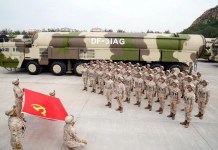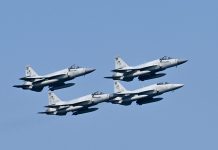Pentagon’s annual report ‘Military and Security Developments Involving the People’s Republic of China 2020’ talks extensively of the growing Chinese military power declaring that Beijing now has the largest navy in the world.
30 Chinese Soldiers Injured In ‘Black-Top’ Clashes In Ladakh, One Indian Solder Dead – Tibet Media
However, experts have questioned the US Department of Defense’s (DoD) report as it fails to address Taiwan’s missiles while it extensively compared China and Taiwan.
David Axe, an Aerospace and Defence contributor at Forbes explained that the 2020 edition of Chinese Military Power Report “mostly portrays China as a seemingly unbeatable martial monolith with limitless resources and ambitions and few viable rivals.
Nowhere in the report is this more painfully obvious than in the several sections the report’s authors devote to Taiwan.” He also asserted that the US has a history of “Pentagon’s propaganda campaign” that was earlier employed against the Soviet Union between 1981 and 1991 when it published “lavishly-illustrated, easy to read and brimming with dire warnings about Moscow’s overwhelming military might.”
“The U.S. Defense Department’s annual Chinese Military Power Report risks taking on the mantle Soviet Military Power once wore. It’s today’s glossy book of American military fibs,” he added.
Taiwan’s cross-Strait relations with mainland China have been deteriorating with Beijing claiming sovereignty over the island and seeking its return to the mainland fold even by force if necessary. It has staged several drills and is firm on its motives.
However, after winning a landslide victory in January, Tsai Ing-wen, from the independence-leaning Democratic Progressive Party, began her second four-year term in May as the President. She has refused to accept the one-China principle and strongly supports the self-governance of Taiwan.
Taiwan has a minuscule defence budget as compared to China. Beijing announced $178.6 billion as 2020’s military spending, trailing only behind the US. People’s Liberation Army (PLA) is the largest active-duty military force in the world, with about 2.18 million active military personnel.
China has been investing in new amphibious ships and arming its bombers with guided cruise missiles.
While it seems that China can easily crush Taiwan’s military using its extensive armaments, the report stated that Taiwan has historically enjoyed military advantages in the context of a cross-strait conflict, such as technological superiority and the inherent geographic advantages of island defence.

However, China’s multi-decade military modernization effort has eroded or negated many of these advantages, it added. Axe claimed that the report missed the most important context by ignoring the extreme difficulty any army will have to face attempting an invasion of an island like Taiwan.
Taiwan possesses a geographical advantage as the strait is stormy and the terrain between the likely landing zones and Taipei is rugged and mountainous.
“The geography alone means that any defender would possess a terrain advantage that would go a very long way toward mitigating an attacker’s numerical and technological superiority,” Axe asserted. “A solitary Taiwanese mine, moored to the seabed in the choppy strait, could sink a brand-new Chinese assault ship carrying a dozen helicopters and a thousand marines. As could a single anti-ship missile, fired by a highly-motivated crew hiding out in a mountainside bunker,” he added.
Taiwanese marines could easily camouflage while armed with anti-tank missiles. A surprise attack would destroy a whole battalion of Chinese light armoured vehicles struggling to navigate a winding mountain road.
Taipei is also leveraging this advantage by investing in asymmetric capabilities like Sea mines and Anti-ship missiles.
Among others, Taiwan’s indigenous supersonic missile the Yun Feng poses a serious risk for China. It can travel thousands of miles with a 500-pound warhead. For propulsion, the missile uses a solid rocket booster that accelerates the missile to its cruise speed, at which point an air-fed ramjet takes over.
“In the event of a Chinese attack, Taiwanese missileers could target ports, airfields and headquarters on the Chinese mainland, exacting a toll on invasion forces before they ever leave China,” warned Axe.
The report failed to mention these capabilities but extensively described China’s ballistic and cruise missiles. “In a chart comparing China and Taiwan’s respective forces, the report’s authors list nearly 1,400 Chinese missiles … and zero Taiwanese ones. That creates the false impression that Taiwan couldn’t answer China’s missile barrages with barrages of its own,” the author concluded.




